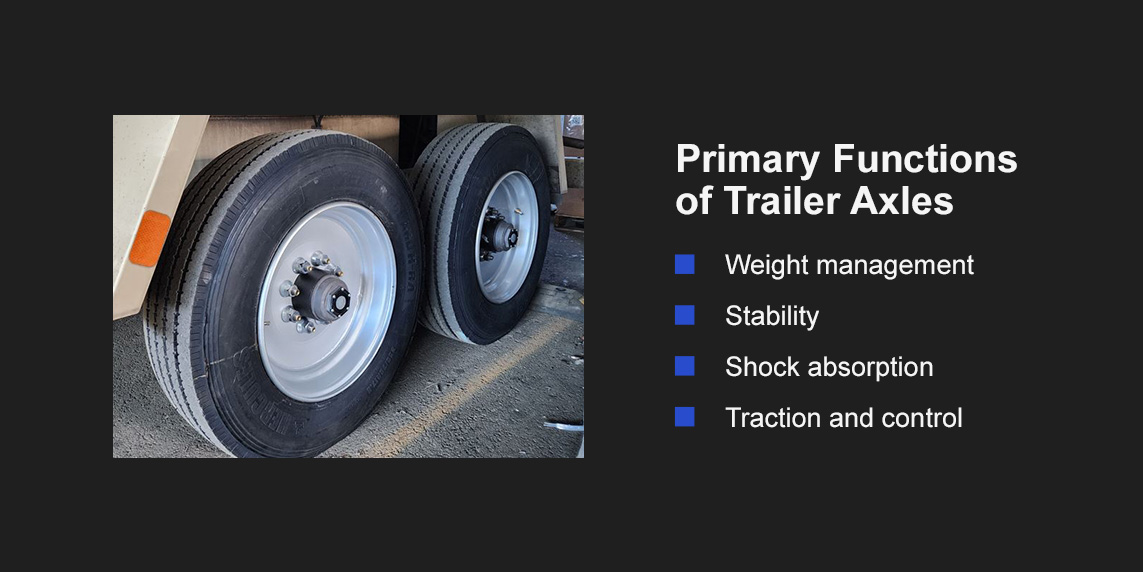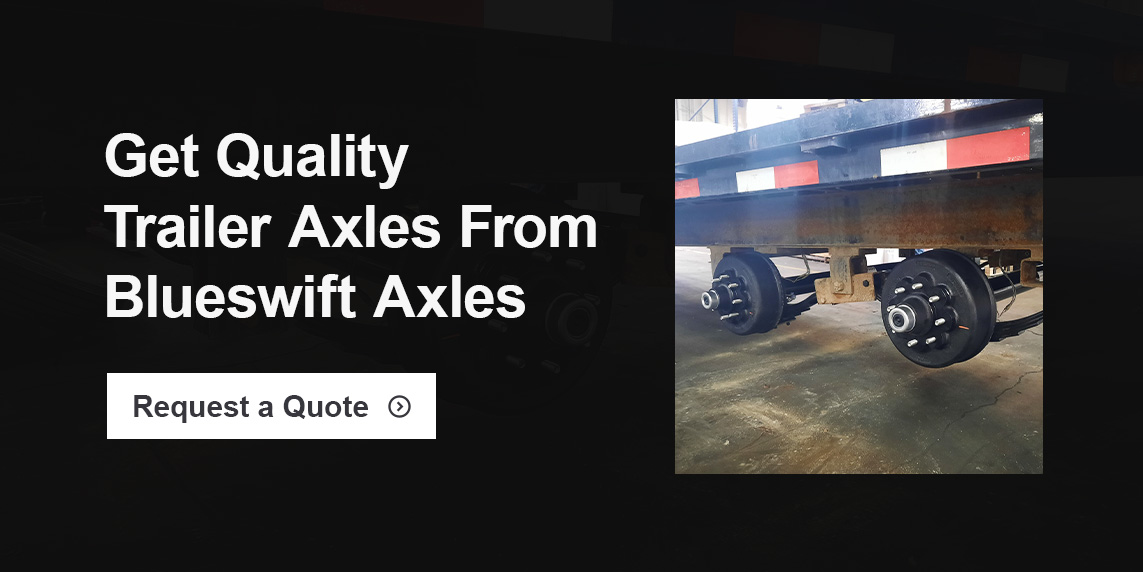Trailer axles are robust components that play an essential role in trailer performance — they are responsible for movement, stability, and the weight capacity a trailer can support. Since axles support the functions of the trailer system by managing weight and streamlining motion, it’s important to have a thorough understanding of these assemblies. This can help you purchase and install the best and highest-quality fit for excellent performance, easy maintenance and improved safety on the road.
Keep reading to learn more about trailer axles, the various types and which to choose for your needs.
What Is a Trailer Axle?
A trailer axle assembly is a system of components that make up a high-strength beam which supports the weight of a trailer and its load. The axle is responsible for the motion of the trailer since it’s connected to the wheels and facilitates rotation. Each and every trailer axle breaks down into these key components:
- Axle beam: This is the most prominent and load-bearing part of the axle. All the other components revolve around the beam.
- Spindles: Trailer axle spindles are cylindrical shafts at the ends of the axles. Spindles are what the hubs attach to and rotate around. They provide a surface for the wheel bearings both inner and outer to roll on.
- Bearings: These components allow smooth rotation within the hub assembly. A full wheel bearing kit has the correct parts to ensure a full repair and smooth installation.
- Wheel hubs: Hub assemblies are located on both ends of the beam and connect the entire axle to the wheels via studs.
- Suspension system: These parts absorb shock. They include components such as leaf springs, U-bolts and spring pads.
- Hanger hardware: These metal brackets, available as hanger kits, secure the axle to the trailer frame.
Trailer axles come in various types and configurations, which we’ll cover in detail. The basic set-ups you’ll find on trailers are single, tandem and triple axles.
Primary Functions of Trailer Axles
An axle must be in good condition for the trailer to function. So, what do trailer axles do?
- Weight management: Axles create a balanced environment that supports the weight of the trailer and load. They consist of robust metal components and are rated to support most of the load capacity compared to the tires and trailer frame.
- Stability: Axles optimize load distribution evenly on the tires, maintaining stability. Thanks to the suspension system, axles keep the trailer stable when making turns, accelerating, braking and driving on uneven terrain.
- Shock absorption: The axle’s suspension system consists of shock-absorbing parts that use springs or torsion mechanisms to absorb impacts while moving. The suspension creates better weight distribution by providing a smooth ride and minimizing wear on other trailer parts.
- Traction and control: Axles impact how the wheels roll and turn. High-quality and well-maintained axles provide smooth maneuvers and enhanced handling. As such, the increased stability accommodates acceleration without tipping or excessive vibrations.
Trailer Axle Specifications and What They Mean
There are various types of trailer axles, with differences ranging from their weight capacities to their suspension setups.
Weight Capacities
Trailer axles come in varying weight capacities designed to support the weight of a fully loaded trailer. You can differentiate them from one another by analyzing the tube thickness, brake size, bolt pattern, and examining the leaf springs in the case of a spring axle. Determine your axle’s weight-carrying capacity by measuring the tube’s diameter. The weight capacities at Blueswift Axles range from 2,000 lbs to 8,000 lbs.
Ground Clearance
Trailers can have a straight or drop axle design. On the standard straight axle, the axle beam is straight from one wheel hub to another, giving the deck a higher height. The straight beam is strong, durable and more suitable for heavier cargo. Drop axles or drop-down axles are the opposite, as the beam sits 4 inches lower than the spindles. The lower deck improves stability and lowers ground clearance, making loading and offloading easier.
Braking System
While the different braking systems are not considered an axle type, they add a layer of functionality that differentiates between axles. Axles have three types of braking systems — mechanical, hydraulic and electric. The most common are hydraulic and electric, which offer much stronger braking power and responsiveness than the cable-based mechanical system.
Like mechanical, hydraulic activates braking using the motion of the tow vehicle. The reduced momentum sends brake fluid to the brakes through hydraulic lines. For electric brakes, a controller mounted in your vehicle sends an electric signal to the trailer brakes via the brake wiring.
Suspension System
Axles have either torsion or leaf spring suspension configurations. Traditional leaf springs are stacked steel leaves that flex and absorb shock before it carries into the frame. Torsion suspension uses a rubber system, where bars attached to the wheel hubs absorb shock when the trailer moves using rubberized material within the axle beam.
Common Issues and Maintenance for Trailer Axles
Here are issues you may encounter with your axles and a few maintenance practices to avoid premature wear:
Signs of Axle Wear or Damage
A worn or damaged axle will significantly impact trailer performance. Here are signs that help you identify an issue with your axle:
- Unusual noises: Worn or broken axle components, such as leaf springs, can cause unusual grinding, clunking or rumbling sounds.
- Misalignment: A wobbly or off-center trailer indicates wheel misalignment, which happens when the axle is bent or broken.
- Vibrations: Excessive vibrations indicate a damaged axle or an issue with its suspension system.
- Fluid leaks: Worn or damaged parts like seals could cause fluid/grease leaks around the axle.
- Reduced control: Poor handling could signify a lack of lubrication for moving parts like bearings or damage to other axle parts.
Maintenance Tips
Proper axle maintenance begins with hauling only what the axle is rated for in regard to weight. You should also conduct regular inspections for signs of damage and wear, such as corrosion, cracks and leaks. If you’re unsure what to look for, a professional can help. Lubricate bearings and bushings as needed to prevent friction on moving parts and repair or replace the axle to ensure the longevity of your trailer.
When to Replace an Axle
You can often repair minor issues with the axle by replacing worn-out parts like the suspension system or wheel hub assemblies. However, severe wear or damage to the axle that leaves it broken, cracked, bent or corroded may require a complete replacement to ensure reliable trailer performance and safety on the road.
How to Choose the Right Axle for Your Trailer
Before you choose a trailer axle, here are things to consider:
- Understanding weight capacity: Trailer axles are rated for specific weight capacities. Exceeding the trailer axle weight capacity could break it, damage your trailer, or accelerate wear and tear. You’ll want to choose axles with combined load capacities that match your trailer and cargo weight.
- Matching axle type to trailer use: Choosing the correct axle type is critical to the trailer’s performance. Single axles will do well for light-duty applications. Consider axle set-ups such as tandem and triple axles for heavy-duty applications like hauling livestock or equipment.
- Customization options: Depending on the purpose of your trailer, you may need customized axles. Reliable providers can build axles tailored to your unique trailer demands and include diverse features, from torsion and spring systems to drop-down beams and lift kits.
Get Quality Trailer Axles From Blueswift Axles
Purchasing high-quality trailer axles should be your top priority. The importance of quality axles lies in their capacity for durability, performance, and easy maintenance. Axles built from strong and reliable materials can withstand regular use, minimizing wear and tear and maximizing life service.
Working with a knowledgeable supplier can ensure the right choice and proper installation. At Blueswift Axles, we understand the diverse needs of trailer axles and provide matching solutions. If you need an axle on short notice, we can build it within 48 hours. Fill out our online form, and one of our experts will get back to you!


